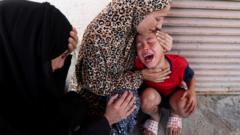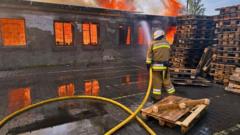Yahya Sinwar, the leader of Hamas, was confirmed dead by Israeli authorities. Following his death, the fate of his body remains uncertain as experts suggest Israel may seek to prevent his burial from becoming a shrine, similar to the handling of Osama bin Laden's remains.
The Death of Hamas Leader Yahya Sinwar: Implications and Future Considerations

The Death of Hamas Leader Yahya Sinwar: Implications and Future Considerations
The assassination of Yahya Sinwar raises complex questions surrounding his remains and potential burial, reflecting the deep-rooted tensions between Israel and Hamas.
Yahya Sinwar, the prominent leader of Hamas, was confirmed dead by Israeli authorities, marking a significant turn in the ongoing conflict in the region. According to a statement from Dr. Chen Kugel, the head of Israel's national forensic institute, Sinwar died from a gunshot injury to the head during a confrontation in southern Gaza. Though the official communication regarding his death has emerged, uncertainty looms regarding the whereabouts of his body and the implications of its future handling.
Dr. Kugel indicated that after the autopsy conducted a day or so following his death, Sinwar’s remains were taken into custody by the Israeli military, yet the location of the body was not disclosed. Historically, Israel has retained the bodies of deceased Palestinians with the intent of leveraging them during future negotiations with Hamas or other militant entities. This pattern echoes Hamas's approach towards the corpses of hostages ensuing from their recent incursions into Israeli territory.
Regarding potential scenarios for Sinwar’s body, analysts predict that Israeli officials will likely prioritize actions that prevent his grave from becoming a focal point for martyrdom among his supporters. Jon B. Alterman from the Center for Strategic and International Studies highlighted the possibility for a discreet burial, a notion analogous to the United States' handling of Osama bin Laden's remains, which were buried at sea to mitigate the risk of veneration in any particular location.
With an estimated timeframe of 24 to 36 hours for the autopsy, there are multiple perspectives on how Sinwar's burial might unfold. Experts postulate a likely site within Israel, emphasizing that officials would be keen to thwart any assertions from Hamas of him being buried within Palestinian territories to bolster their narrative.
Sinwar's death comes at a time of heightened tensions, mirroring the assassination of Hamas leader Ismail Haniyeh in Iran earlier this year, where he was interred in Qatar, attracting significant public expressions of mourning. The contrasts in how both leaders' remains are handled may further underscore the delicate balance of power and symbolic meanings in this protracted conflict.
The examination of Yahya Sinwar's assassination therefore yields not just questions about his end but also ongoing implications for the region's future dynamics, cloaked in layers of historical tension and societal strife.






















